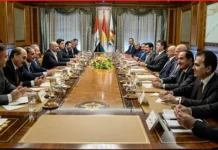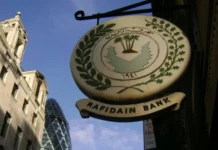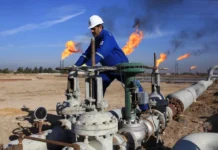Tishwash: Oil: The gas sector receives exceptional attention from the Prime Minister.
The Ministry of Oil confirmed, on Thursday, that the gas sector has received exceptional attention from Prime Minister Mohammed Shia Al-Sudani.
A statement by the Ministry of Oil received by the Iraqi News Agency (INA) stated that “Undersecretary of the Ministry of Oil for Gas Affairs Izzat Sabir Ismail, during his speech at the Second Liquefied Natural Gas Forum, stressed the importance of government support for the gas industry and investment sector to achieve the ministry’s goals and plans for optimal investment of this resource, in a way that supports the national economy and sustainable development.”
He added, “The gas sector has received exceptional attention from Prime Minister Mohammed Shia Al-Sudani and Deputy Prime Minister for Energy Affairs and Minister of Oil Hayan Abdul-Ghani, as the government has worked to support gas industry and investment projects, which have contributed to increasing national production of natural and liquid gas in accordance with the government program. The volume of gas investment in general has increased to more than seventy percent after it did not exceed fifty-two percent during the first year of the government’s term.”
He pointed out that “the most important of these projects, implemented by the Ministry and its national companies in cooperation with specialized international companies, are concentrated in the governorates of Basra, Maysan, and Dhi Qar, in addition to the central and Kirkuk fields.”
He explained that “achieving this exceptional leap in production represents a bright sign towards achieving our goal of stopping – and achieving zero – gas flaring during the period extending from 2028 to 2030, which in turn leads to the elimination of harmful emissions to the environment and public health, in addition to fulfilling our moral commitment to the 2016 Paris Agreement, which strengthens Iraq’s position and role in the international community and the global energy sector.”
The Undersecretary of the Ministry highlighted “the importance of “liquefied gas” as it represents a vital economic tributary that generates significant financial returns for the country and contributes to diversifying sources of income,” noting that “the Ministry of Oil’s support for this forum stems from its keenness to ensure the development of this industry through economic methods, approaches, and mechanisms built on sound foundations, achieving the highest benefit for the national economy.”
The Undersecretary of the Ministry affirmed that “the forum is an important opportunity to exchange views, discuss technical and commercial challenges, and review development and expansion opportunities, in line with the government and ministry’s plans in this field. We look forward today to constructive discussions and practical, implementable outcomes that will contribute to drawing a clear roadmap for the future of liquefied gas in Iraq.”
The Undersecretary of the Ministry revealed “Basra Gas Company’s plans to reach a production of more than eight thousand tons per day of liquefied gas in the next few years, as its current production stands at six thousand tons per day. Achieving this exceptional qualitative leap in production represents a bright sign for the gas sector.” link
***********
Tishwash: Government advisor: Foreign exchange reserves are the highest in Iraq’s history.
The Prime Minister’s financial advisor, Mazhar Mohammed Salih, confirmed on Thursday that Iraq is witnessing economic stability and developmental prosperity, with low inflation and unemployment and high growth. He also noted that foreign exchange reserves are the highest in Iraq’s history.
“Iraq faces strong economic challenges in the geopolitical context due to the ongoing war in the Middle East,” Saleh told the official agency, followed by Iraq Observer. “This may be related to the movements of Iraq’s trade balance with the world, especially oil exports and energy markets. While the Gulf and the passage of oil and gas through the Strait of Hormuz represent approximately 30 percent of the flow of energy from its sources to the world, 99 percent of Iraq’s oil is currently exported through the Gulf and the aforementioned strait to world markets, especially the economies and markets of Asia.”
“The increase in crude oil prices, which jumped by nearly $10 before the recent outbreak of the Iranian-Israeli war, is a positive price shock,” he added. “However, at the same time, we must be careful about the consequences of the war and the safety of oil routes in the Gulf, without forgetting that import trade is also bearing risks represented by rising shipping and insurance costs and rising prices, which may increase with the escalation of conflict levels across the Gulf as well.”
He explained that “the positive external price factors in the value of oil exports, which are dependent on geopolitics, should not be the basis for sustainable fiscal policies based on oil revenues, which constitute a central component of public revenues and shape the 2025 budget schedules, unless stability is achieved and the threat of war in all its forms is eliminated.”
Regarding the government’s delay in submitting the federal general budget schedules for the year 2025, Saleh explained that “one of the requirements stipulated in the Triennial General Budget Law No. 13 of 2023 is due to the amendment of some paragraphs of the Federal General Budget Law for the three years 2023, 2024 and 2025 last February of this year, which were originally covered by Law No. 13 of 2023.”
He explained that “this required systematic, practical and oversight communication between the House of Representatives and the government and its bodies represented by the Ministry of Finance to accurately and comprehensively monitor federal revenues and all financial procedures, especially the management of current operational and investment expenditures without interruption, as well as deficit financing.”
He pointed out that “the delay in submitting the schedules was influenced by external factors, which are merely reflections of external geopolitical shocks, whether global trade wars, the energy markets experiencing some price contraction before their sudden improvement, or the beginning of indicators of a downward and upward oil asset cycle that should have been addressed by adjusting some spending rules.”
Saleh pointed out that, “Despite the ongoing concerns raised during the first half of the current fiscal year, regarding complete financial stability, our country’s financial situation has not shown any concerns. This is due to sound management and the high degree of compatibility between the country’s fiscal and monetary policies, as monetary policy supports the country’s financial policy with its foreign currency reserves, which are the highest in Iraq’s history.”
He emphasized that “during such periods, monetary policy plays its role in stimulating the domestic financing market with the strength of reserves, particularly in supporting and stabilizing liquidity and general cash flows in the country. This is done to ensure government development programs for the diverse and comprehensive infrastructure projects our country is witnessing, given their role in stimulating the labor market and businesses.”
He continued, “All fears have been dispelled due to the mutual and cohesive immunities within the framework of the economic policy itself and the implementation of the government’s program, coupled with high financial excellence and discipline.”
He explained that “the delay in submitting the 2025 budget schedules to the House of Representatives did not prevent the implementation of the public finance program covered by the basics of the current general budget law, but the external circumstances and successive international economic shocks in the energy market, and the amendment to the current law No. 13, as we mentioned, regarding the issue of assessing the costs of extracting the region’s oil and its marketing costs, are what required time for partial adjustment in some of the constants and variables related to revenues, public expenditures, and deficit management.”
He pointed out that “these tables will be submitted in the coming period based on the provisions of Article 77/Second of Law 13, as mentioned above, which requires the House of Representatives to approve the general budget tables for the current fiscal year, which are now at the end of their preparations for presentation to the House.”
He concluded by saying: “The strength of the coordination between the government’s general policies in the financial and monetary fields has dispelled all those concerns about the management of problems resulting from the global economic situation.
Rather, it is working in the interest of the sustainability of economic stability and sustainable development in our country, which is witnessing years of high stability and remarkable development prosperity, whether through low inflation rates, low unemployment rates, or high levels of growth, especially after the launch of the philosophy of strategic partnership between the state’s economy and the market, within the social market strategy that stipulates protecting the stability of citizens’ living standards and supporting the role of the market in investment, reconstruction, and development together.” link





